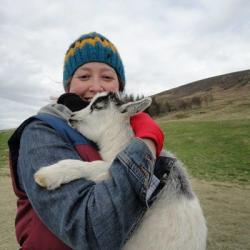
Following the easygoing success of last year’s inaugural Iceland Noir crime lit festival, this year’s event is already off to a good start. The three day festival will involve two jam-packed days of author panels, talks, and readings at the Nordic House, as well as a Sunday ‘Snæfellsnes Mystery Tour’ lead by Yrsa Sigurðardóttir. But while the festival itself is limited to registered participants, tonight’s opening event—an evening of crime fiction readings (in English and Icelandic) hosted by the Icelandic Crime Society—was open to the general public.
The spacious upstairs salon at Sólon, the downtown bar which is also doubling as the festival’s “official watering hole for the duration,” was standing-room only when I arrived just before the reading’s start. With such a full house, the room was warm, to say the least (‘sweltering’ might be a more apt description), and with the windows fogging over, the buzz of cheerful conversation, and a jaunty jazz trio warming up the crowd before the readings got underway, it was all pretty cozy.
The night kicked off with three readings by visiting authors. First up was Norwegian author Vidar Sundstøl, reading from his novel The Land of Dreams, which won the 2008 Riverton prize for best Norwegian crime novel. Drawing on Vidar’s experiences living in the Midwestern state of Minnesota for ten years, The Land of Dreams is the first installment of a trilogy centered around a small town on the Northern shore of Lake Superior. His own explanation of the set-up and his reading were both quiet and understated, but the passage (at the novel’s start) was tense enough to hold the audience’s attention. He left off with a bit of a cliff-hanger, and I suspect I won’t be the only one in the room who seeks out a copy of the book soon.
Next up was Finnish author Antti Tuomainen, who informed us that he’d only be reading a very short section from the start of his third novel, The Healer, as he’d have to read the text from his phone. “I didn’t remember to bring any books with me,” he explained with a laugh. “I’m a writer—why should I remember books?” Set in a post-climate disaster, near-future Helsinki, The Healer won the Clue award for bet Finnish crime novel of 2011, and is, Antti informed us, both “a love story and a crime story.” His reading was very brief, as promised, giving us just the barest glimpse of the novel’s apocalypse-in-process.
The animated David Swatling, an American who has lived in Amsterdam since 1985, took the stage next. His psychological thriller, Calvin’s Head, is his first novel and so, he joked, the reading was rather exciting for him: “This is the largest room I’ve ever played to.” (In fact, David’s been a theater actor and director in New York and Amsterdam, as well as radio reporter, writer, and producer. So that was probably a bit of an exaggeration.)
As it turns out, the premise for his novel is based on personal experience. “I was homeless and living in my jeep with my dog in Amsterdam,” he explained, “it’s a very boring story.” One day, he and his dog came across a crime scene, and so was born the idea for Calvin’s Head, written all these years later. David read from the point of view of his homeless protagonist, before flipping to the perpective of an unhinged character who calls himself Gadget, since “everyone loves a psychopath.” David’s theater and radio background were put to good use during this part of the reading: Gadget was personified as a manic, high-pitched, Wallace Shawnesque voice, which was certainly a change of pace.
Following the three guest readers, Icelandic authors Finnbogi Hermannsson and Guðrún Guðlaugsdóttir took the stage. A former reporter in the Westfjörds who has authored a very well-received trilogy about a young boy growing up in Iceland in the post-war years, Finnbogi has just published his first crime novel, Illur fengur (‘Ill-Gotten Gains’). His reading (in Icelandic) was prefaced with a fair number of historical anecdotes, remembrances, and (I think) some poetry quotations, and was well-received by the crowd.
Guðrún—who has been a journalist for Morgunblaðið for thirty years and has published interview books, biographies, short stories, and novels—has also just recently published her first crime novel, called Beinahús (‘Bone House’). Set during the war years, the novel was inspired by an article she once wrote about a human bone that was found in a residential area. (At least in the basics, it bears noting, this premise calls to mind that of another Icelandic crime novel—Silence of the Grave, by Arnaldur Indriðason.) I’m persuaded that Guðrún’s reading was one of the night’s more anticipated of the evening—I was asked by one late-comer if she’d missed it (she hadn’t) and heard several people talking about the book at a nearby table.
After a short, spirited reading (not by the author) from Steinar Bragi’s Kata, a novel about the disappearance of a young woman which explores themes of gender and revenge, there was a short pause. The jazz trio started up again and I, alas, had to take my leave before the last three readers: Jón Óttar Ólafsson, as well as two of the festival’s co-organizers, Yrsa Sigurðardóttir and Ragnar Jónasson. But nevertheless, it’s clear that Iceland Noir has started with a bang.
Buy subscriptions, t-shirts and more from our shop right here!















